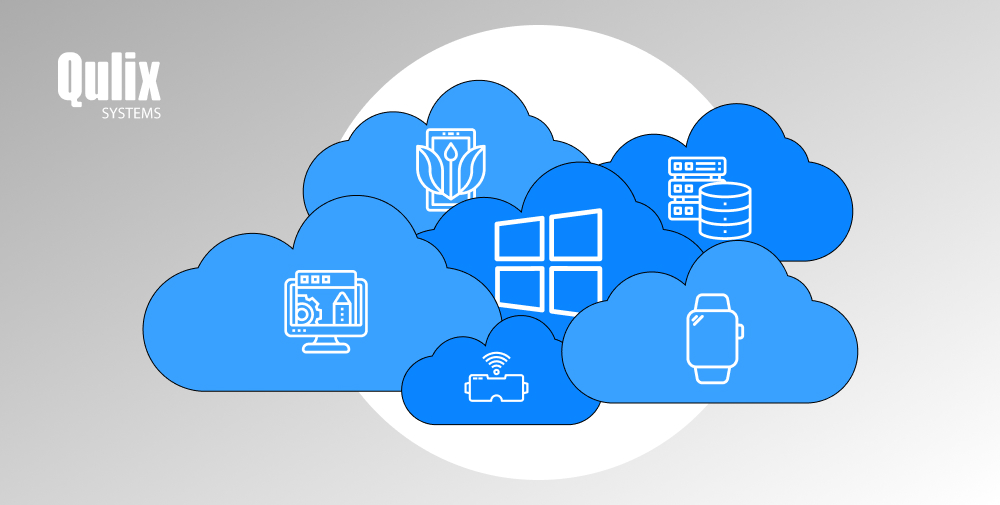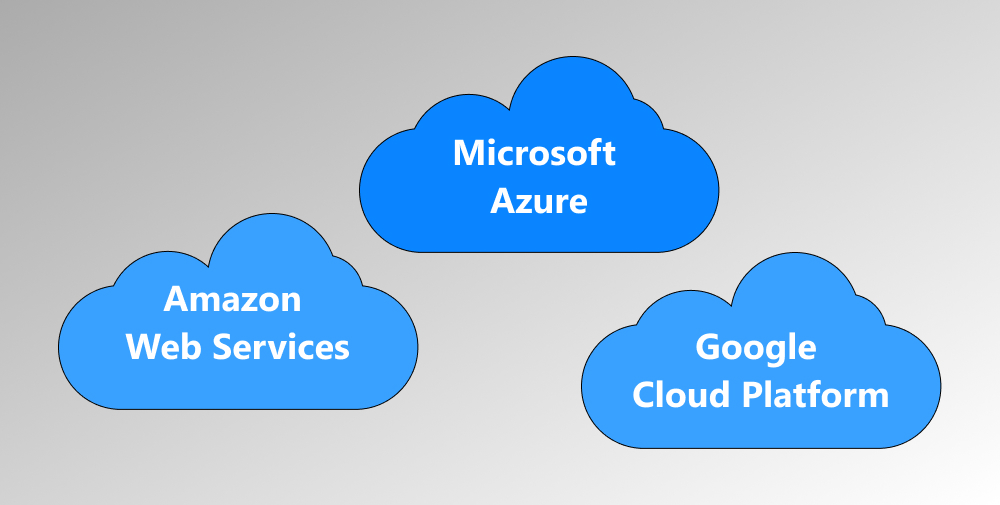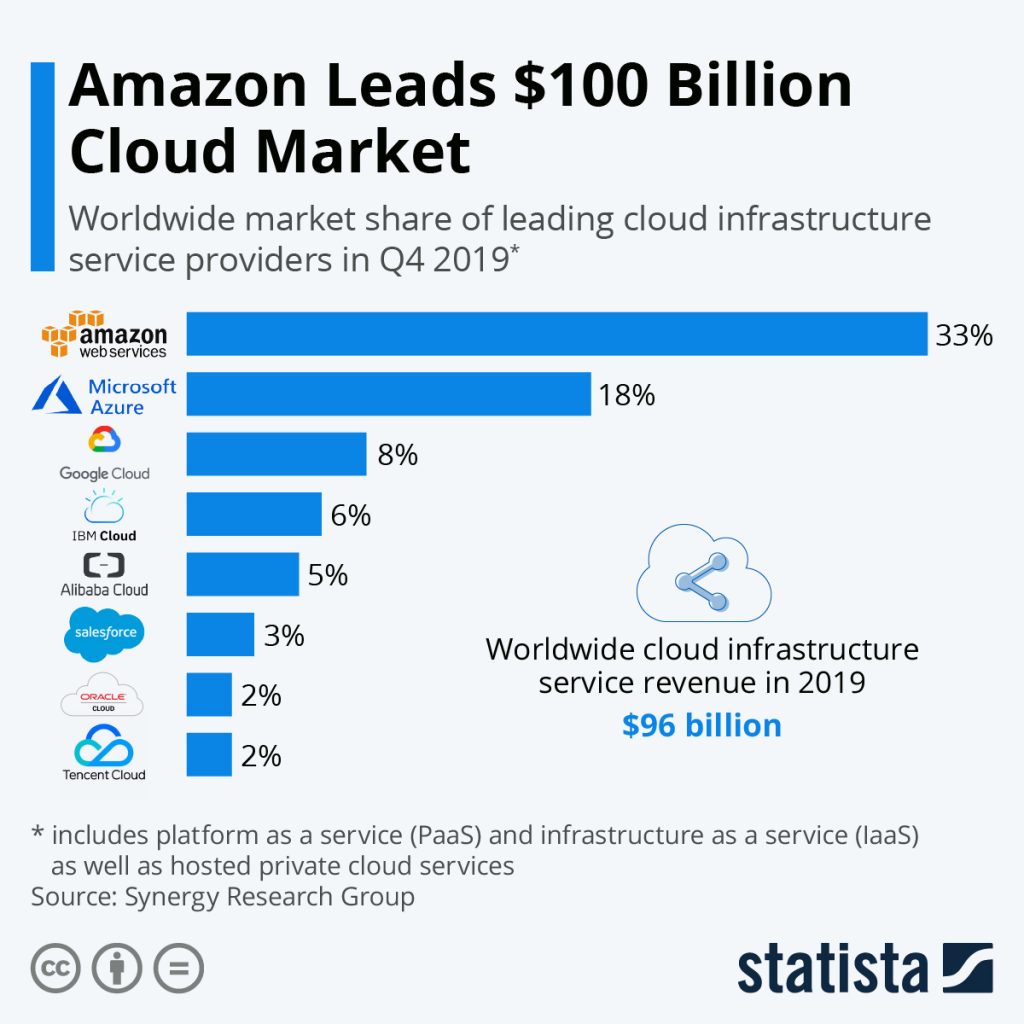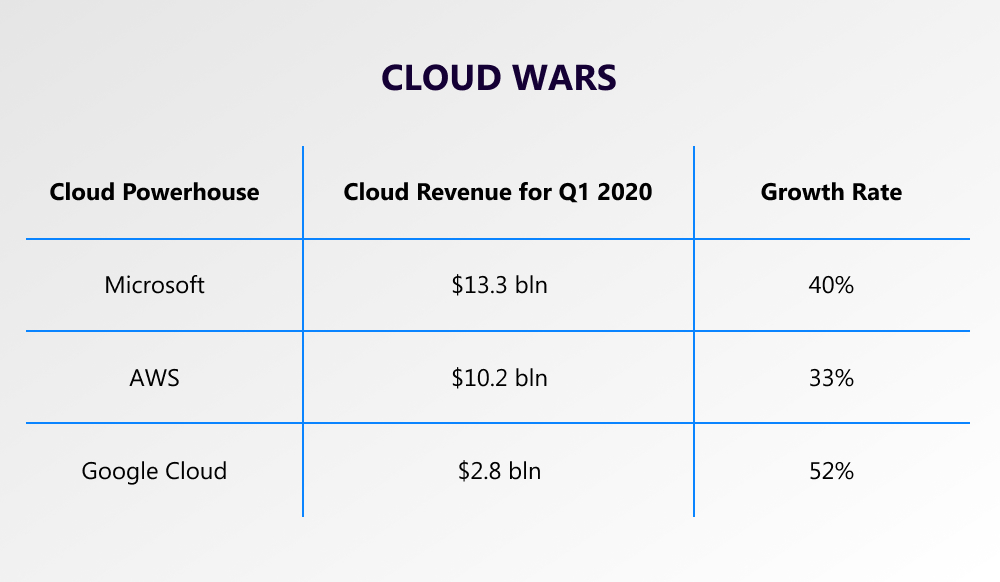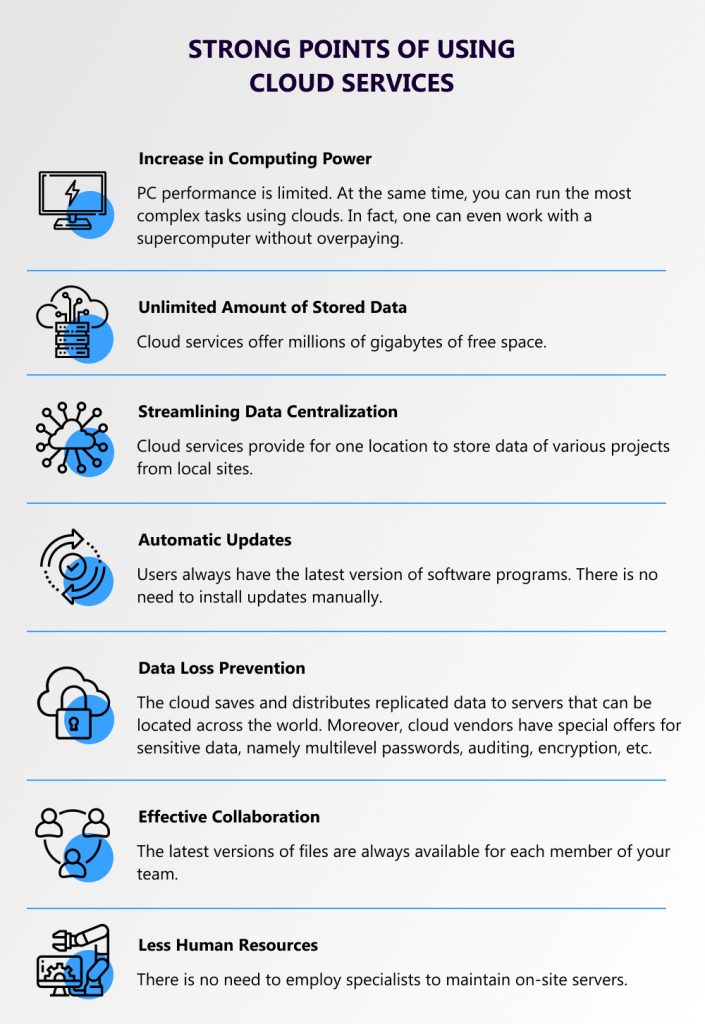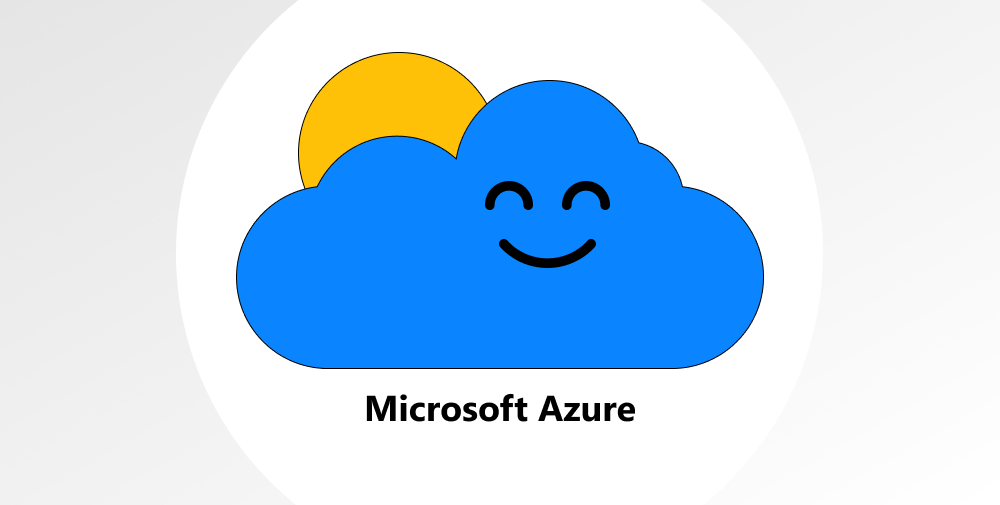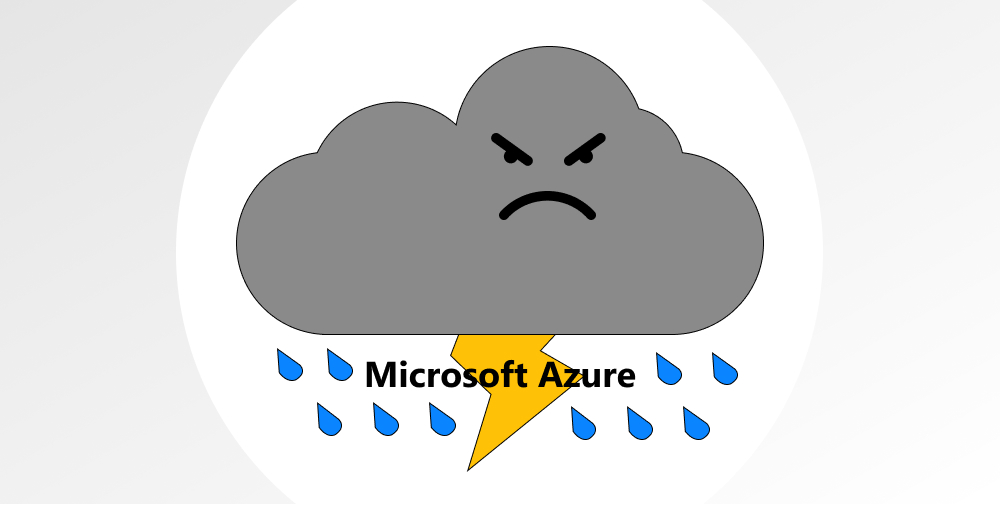The fact that cloud computing is here for the long haul is beyond questioning. Moreover, when it comes to cloud computing technologies, we are discussing not just another trend in the IT market, but without any exaggeration, a new business reality. And in this reality, there is one strong player under the name of Microsoft Azure or simply Azure. This cloud system was especially designed to make access easier for enterprises of all shapes and sizes. So, what's so special about it? Keep on reading for more details!
written by:
Anton Rykov
Product Manager
Clouds Winning Businesses
Key findings from the 2019 State of the Cloud Report from Flexera look really impressive: a multitrillion-dollar cloud market has already won over 94 percent of businesses and it does not seem to stop. Despite the contribution of small cloud businesses, this tremendous business reality transformation is mainly due to such cloud giants as Azure, AWS, and GCP.
In this article, we highlight the pros and cons of Microsoft Azure, one of the major suppliers of disruptive cloud technologies. What’s good and bad about Azure cloud services and why have they managed to gain such wide acceptance among businesses?
To make this journey more enjoyable and informative for you, we’ll start from a bit of history, then brief you on the biggest cloud players for today (Azure, AWS, and GCP), and will finally focus on the pros and cons of Azure.
History Lesson
The worldwide public cloud market is projected to reach $266.4 bln in 2020 and $354.6 bln in 2022, Gartner states. It’s easy to believe, given the importance of computing power for businesses. However, things have not always been this way. When and how has cloud computing started?
The idea of cloud computing was born in the 1950s when scientists first started talking about the general concept of time-sharing. However, the first cloud in its modern vision appeared only in 2006. This was Amazon Web Services. The second was Microsoft who launched a similar Azure service in 2010, with Google Compute Engine joining the race in 2012. Surely, it was only a matter of time before other companies realized the potential of the cloud and real competition began. Yet, the strategic moment was lost for the majority when Amazon, Microsoft, and Google started the game, and they are still well ahead of the rest.
The Three Gigantic Clouds
Now let’s have a brief look at each of the three cloud market leaders.
Amazon Web Services
Currently, this is the most popular cloud platform providing over 175 full-featured services for data centers around the globe. Major corporations and the biggest government agencies use AWS to cut costs and speed up innovation processes. What's so good about this cloud platform is that it offers IaaS, PaaS, and SaaS all in one place.
Microsoft Azure
Microsoft Azure is a multi-faceted, complex system that supports many different services, programming languages, and frameworks. If you’re an enterprise customer, you will surely appreciate the advantages of the Azure cloud in full. There are few vendors who have such an excellent enterprise background as Microsoft.
Google Cloud Platform
Google Cloud Platform is the youngest of the three. The platform does not have such corporate focus as Microsoft, although its deep technical expertise and top-notch tools make up for this disadvantage. Google has created a rich ecosystem within its platform offering such services as container orhestration, automation tools, hybrid and multi-cloud environments, compute power and serverless platforms, access and security control, and much more.
These top cloud computing vendors each have their own strengths and weaknesses. Although AWS is definitely in the lead, both Azure and GCP have their pretty impressive shares in the market. Let’s have a look at what Statista has to say on the issue.
At the same time, even though AWS holds 33% of the global market, the Q1 2020 statistics show a clear increase in the interest in Microsoft products.
This growth is not accidental. Despite the huge popularity and broad functionality of AWS worldwide, more and more companies prefer Azure, considering it the most reliable and secure cloud platform for hosting enterprise and hybrid infrastructure.
Besides, a large number of enterprises deploy Windows and other Microsoft software in their daily office work, which also affects the decision-making process. In such cases, they are less skeptical about the pros and cons of Windows Azure, as the Microsoft-run cloud is the right way to go.
What’s So Good about Сloud Technologies in General?
When listing Azure benefits, we cannot but mention some that are typical of MOST cloud vendors. After we’re done with the general part, we’ll swiftly move towards Azure-specific advantages.
See below for the advantages which sustainable engagement of cloud vendors, including Azure Cloud, may open up for your company.
Advantages of Microsoft Azure
As we’re clear now about the general cloud benefits, it’s time for the proper advantages of Microsoft Azure as such.
- Apart from the basic features of an operating system, Microsoft Azure has additional ones: on-demand resource allocation for scaling, automatic synchronous data replication to improve fault tolerance, infrastructure fault handling to ensure continuous availability, etc.
- Almost all Microsoft Azure services have an API based on restrictions for distributed REST systems, which allows developers to use cloud services with any operating system, device, and platform.
- Each user can create and manage their own services using the Azure Portal visual interface. The portal allows to configure services, edit access permissions, track resource status, and manage billing.
- Microsoft focuses deeply on the hybrid cloud, which eases up bridging the legacy data center with the scalable Azure. It’s a true strength.
- A great thing to know before moving to the cloud is that Azure Cloud Microsoft now offers their clients the Azure Migrate tool to simplify migration.
- Since June 2013, Microsoft has abandoned hourly rates. The consumption of Microsoft Azure computing resources (effective runtime of virtual machines, cloud services, mobile services, or websites) is calculated and paid per minute.
- Last but not least. If you are already a Microsoft enterprise customer, you are very likely to get good discounts.
Disadvantages of Azure Cloud Services
Surely, we don’t want you to stay biased about Azure, so we give you some Azure Cloud disadvantages for a 360 degree perspective on the matter.
- Azure users won’t have offline access to the system in the event of the main system outage.
- No cloud service provider can really guarantee 100% security. Over the past few years, hackers have attacked many key providers, including Azure.
- Many users note that the Azure interface feels overly complicated. Acceptance is slow when it comes to staff that lack technical expertise.
- Advanced tasks imply a steep learning curve and require extensive knowledge.
- Azure may become rather pricey if not adequately managed. However, in response to that Microsoft has special tools for managing billings (Azure advisor, Role-Based Access Control, etc.).
Bottom Line
The bottom line is that by choosing Microsoft Azure you opt for a great experience in corporate servicing, top-notch technologies, and high customization. At the same time, Azure is known for its high costs, steep learning curve, and online service solely. All these pluses and minuses point to the fact that no cloud vendor can be perfect for everyone.
Nevertheless, with all the pros and cons of using Microsoft Azure, Microsoft is currently the leader for analytics and BI platforms by Gartner estimates. Moreover, 95% of Fortune 500 companies preferring exactly this cloud vendor can’t be all wrong.
P. S.
We do not deny that there are many businesses that are completely reluctant to migrate to the cloud. We do not even deny that if you belong to them you may not really need the cloud to stay afloat. Yet to excel you’d better harness the potential of modern-day technologies. Turn to the experts for advice. Let them evaluate your public cloud needs precisely on a case-by-case basis so that the migration runs smoothly and unlocks the new potential of your business.
Qulix Systems can be exactly such an expert partner to move your assets to Azure Cloud or AWS, or GCP, or whatever cloud vendor you may choose. We have solid expertise in cloud technologies and have carried out multiple successful cloud migrations. Reach out to our support team for more details on our cloud competencies or visit our website to have a look at our portfolio.

Contacts
Feel free to get in touch with us! Use this contact form for an ASAP response.
Call us at +44 151 528 8015
E-mail us at request@qulix.com

